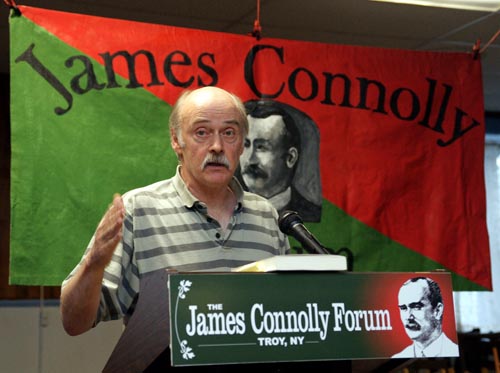| |
|
| |
Links to TV/Radio Interviews & Articles about Richmond & REFINERY TOWN |
| |
Richmond, CA.’s renaissance as a “progressive city” has thrust many of its leading personalities into the media spotlight in recent years. But none of our local luminaries can match the singular popularity of 98-year old Betty Reid Soskin, whose life and work are now the subject of a new film....
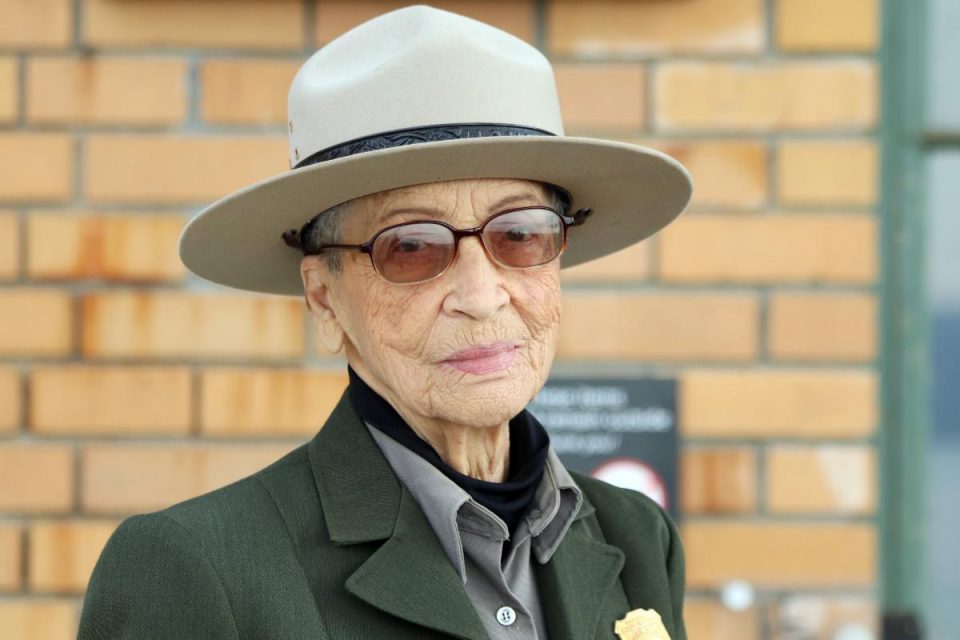
beyondchron.org
Richmond’s Park Ranger: Why Betty Reid Soskin Has “No Time To Waste” - Beyond Chron
|
| |
|
| |
laprogressive.com
 By: Suzanne Gordon and Steve Early By: Suzanne Gordon and Steve Early
"The vet-to-cop pipeline is a little-noted contributor to militarized policing.
Getting police departments to stop acting like an occupying army will require
much closer screening of job applicants who are veterans and ending their preferential hiring treatment…"
From: Trading One Uniform for Another |
| |
|
| |
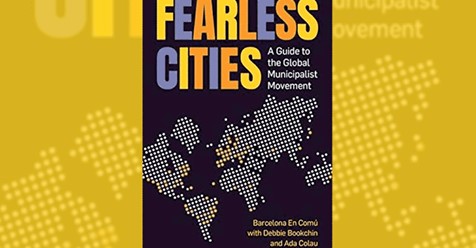 Majority Majority
"For progressive officials to succeed in office — and remain accountable to the constituencies that elected them — these office-holders need to be part of broader municipal reform groups or socialist organizations that are membership-based and continuously engaged in multi-issue, non-electoral organizing.” From a review of "Fearless Cities: A Guide to the Global Municipalist Movement." |
| |
|
| |
| |
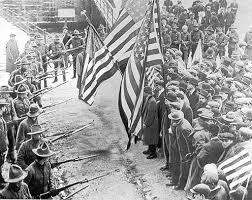 The Power of the Bread and Roses Strike The Power of the Bread and Roses Strike
by Steve Early
KPFA
Listen/Download in itunes
02.21.19 - 10:00am
A conversation on KPFA about the historic Bread and Roses strike in 1912 in Lawrence, Massachusetts. It was a strike led by immigrant female textile workers and organized by the Wobblies. Guest: Steve Early is a lawyer, organizer, union representative, a longtime labor journalist. He is the author of Save Our Unions: Dispatches from a Movement in Distress, The Civil … Continued |
| |
|
| |
The Housing Affordability Crisis and What Millennials Can do About It
by Steve Early
December 12, 2018
CounterPunch
When millennials head home for the holidays this month, many who are city dwellers will be hosted by parents or grand-parents whose housing is far more spacious and financially secure than their own. Even guests with well-paid jobs in relatively stable rental markets will cast an envious eye at the benefits of baby boomer house buying decades ago.
That’s because these holiday visitors belong to what Berkeley author Randy Shaw calls “a generation priced out” of rental housing and opportunities for home-ownership in many American cities….For rest of review, see: https://www.counterpunch.org/2018/12/12/the-housing-affordability-crisis-and-what-millennials-can-do-about-it/ |
| |
|
| |
“They Count on You Not Knowing:”
Socialists Blow the Whistle on Democratic Party Donor Class
by Steve Early
October 4, 2018
CoutnerPunch
Wealthy Bay Area investor David Crane is a leading promoter of the neo-liberal agenda within the California Democratic Party. A former advisor to Republican governor Arnold Schwarzenegger, Crane is a widely-published critic of state and local tax initiatives, publicly-funded health care, public education, public employees and their pensions. He raises lots of money for “courageous” candidates willing to put “citizen interests” ahead of such “special interest” causes. |
| |
|
| |
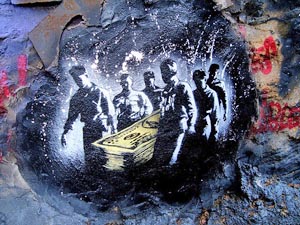 Big Money in Politics: Are Leading Democrats Really on the Wagon (or Still Sneaking a Drink)? Big Money in Politics: Are Leading Democrats Really on the Wagon (or Still Sneaking a Drink)?
by Steve Early
September 12, 2018
CounterPunch
For voters concerned about the bad consequences of big business spending on elections, a New York Times report last month promised mid-summer relief. “Tired of Money in Politics, Some Democrats Think Small,” the headline read. The accompanying article, which focused on a Minnesota Congressional contest, noted that, “in mid-term races around the country…dozens of Democrats [are] rejecting donations from political action committees, or PACs, that are sponsored by corporations or industry groups.” |
| |
|
| |
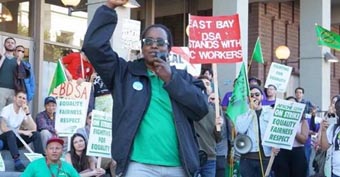 Teamster Tackles Corporate Democrat in California Assembly Race Teamster Tackles Corporate Democrat in California Assembly Race
By Steve Early
August 31, 2018
Labor Notes
Jovanka Beckles rallied with campus workers recently. The odds are stacked against rank-and-file union members who run for office... but this Teamster, county worker, and community activist has made it into the general election for a California Assembly seat.
She's up against an establishment Democrat. Photo: Jovanka Beckles for District 15
|
| |
|
| |
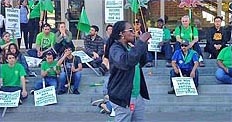 Can a California Refinery Town Heroine Beat Big Money In Politics Again? Can a California Refinery Town Heroine Beat Big Money In Politics Again?
By Steve Early,
July 11, 2018
Beacon Broadside
Jovanka Beckles with campus workers at UC-Berkeley. Photo credit: Steve Early
Since the election of Donald Trump and inauguration day protests against him across the country in January, 2017, some women involved in that nationwide movement have decided to run for office themselves. At the local, state, and federal level, first-time female candidates are challenging both conservative Republicans and corporate-backed Democrats.... |
| |
|
| |
 Flush With Cash: Flush With Cash:
Will Buffy the Bernie Slayer Win in Pro-Sanders District?
by Steve Early
May 9, 2018
CounterPunch
In a political culture shaped by big money, entrepreneurial candidacies, single-issue campaigning, and union dis-unity, you can run but not hide from crowded fields of Democrats. In many current primary races, they are all claiming to be “progressive,” even as they raise and spend millions of dollars competing against each other—money that might have been better spent on actual movement building? See the full story >>
|
| |
|
| |
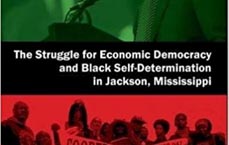 From Jackson to Richmond: From Jackson to Richmond:
Radical Mayors
Leave Their Mark
Steve Early
March 23, 2018
CounterPunch
Two new books about making change in smaller cities are worthy of close study by anyone hoping to push their own city hall in a similar progressive direction. See the full story >> |
| |
|
| |
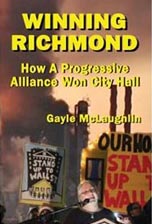 One of the heroines of Refinery Town has just published her own mayoral memoir - One of the heroines of Refinery Town has just published her own mayoral memoir -
check review here and order a copy from Hard Ball Press in NYC!
A Working Class Mayor Is Something To Be - Labor Notes
Well before the Trump era, U.S. presidents failed to address urban problems, or made them worse. Congress, state legislatures, and governors were the same.
The job of fighting poverty, inequality, and environmental degradation shifted to the municipal…
|
| |
|
| |
LA Progressive, Tuesday, 20 February, 2018
A Report From Torrance:
Refinery Safety Campaign
Frays Blue-Green Alliance
By Steve Early
See the full story >> |
 |
| |
|
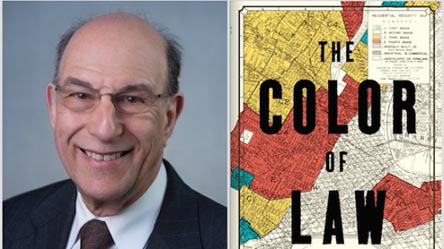 Rothstein in Richmond: Rothstein in Richmond:
Raising Consciousness
About The Color of Law -
Beyond Chron
By Steve Early
Richard Rothstein was in Richmond last week, raising consciousness about the Color of Law;
See the full story >> |
| |
|
“The Workers of the World Do Need to Unite”
By Steve Early
Interview by Mohsen Abdelmoumen: "You have written a book about the city of Richmond, California, where you live, prefaced by Senator Bernie Sanders: "Refinery Town:…"
|
|
| |
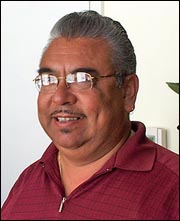 A Toxic Tour With Tales of Resilience - Beyond Chron A Toxic Tour With Tales of Resilience - Beyond Chron
By Steve Early
Befitting a city rich in history, Richmond has multiple guides to its past. On the waterfront, Betty Reid Soskin, the nation’s oldest park ranger, holds forth at the Rosie the Riveter Homefront Museum, informing visitors from far and near about the World War II experience of African-Americans. Now 96 and nationally known, Soskin witnessed first-hand how Kaiser shipyard workers, who emigrated to California from black communities in the south, faced discrimination on the job and in Richmond. Her moving personal testimony provides a rare window into the world of civil rights pioneers in the East Bay and nationally, in the 1940s.
Less famous among tourists but no less impressive as a narrator of local history is Andres Soto . . .See the Full Story >> |
| |
|
| |
 A Tale Of Many Cities: Potholes in the Road To Municipal Reform A Tale Of Many Cities: Potholes in the Road To Municipal Reform
By Steve Early
There is no better role model for aspiring radical scribes than Juan Gonzalez. The country’s leading Latino journalist is cohost of Democracy Now!, a former columnist for the New York Daily News, and now author of an important new book on progressive municipal politics and policies in New York and other cities, including Richmond, CA.....
For rest of this review, see: https://www.counterpunch.org/2017/09/01/a-tale-of-many-cities-potholes-in-the-road-to-municipal-reform/ |
| |
|
|
| |
|

In These Times » AUGUST 8, 2017
Diverse, Radical and Ready to Resist: Meet the First in the New Wave of Local Progressive Officials
At Local Progress’s 150-person meet-up, left-leaning municipal leaders from around the country share plans to build rebel cities.
BY STEVE EARLY
|
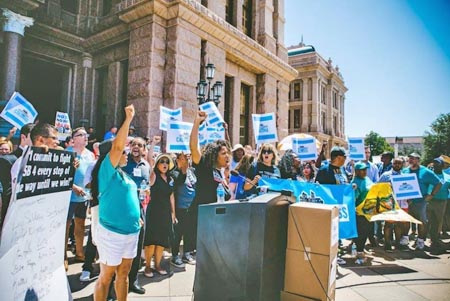
|
For details, see http://inthesetimes.com/article/20412/local-progress-fights-trump-local-elections-resist-
labor-education |
Local Progress officials took a break from the conference to demonstrate with the Workers Defense Project and Texas Organizing Project in front of the Texas capitol. They were protesting anti-immigrant S.B. 4, a measure to preempt sanctuary city policies. (Local Progress/Bryan C. Parker Photography) |
|
| |
|
| |
5 years after wake-up call on refinery safety, more work needed
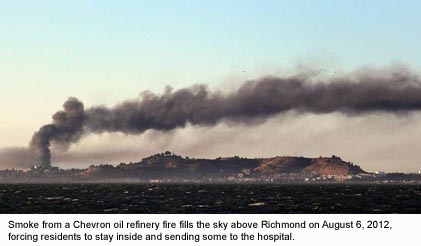 By Steve Early By Steve Early
www.sfchronicle.com
Only nonstop labor and community organizing can make oil refineries less harmful to their own workers, air quality, community health and the environment in general.
Since the Chevron fire, safety advocates have pressured Big Oil through lobbying, litigation, regulatory intervention, electoral politics and strike activity.
Four years after filing suit against the company, Richmond is still seeking a damage settlement for "years of neglect, lax oversight, and corporate indifference to necessary safety inspection. - See the full story >> |
| |
|
| |

New York Times, The Opinion Pages | OP-ED CONTRIBUTOR
A Dangerous Idea: Eliminating the Chemical Safety Board
RICHMOND, Calif. — The United States Chemical Safety Board is a federal watchdog with more bark than bite. It has five board members, a tiny staff of less than 50 and a budget of some $11 million a year. Its mission is to investigate fires and explosions in oil refineries and chemical plants.
The board can’t impose financial penalties for corporate misbehavior and has no rules of its own to enforce. It merely issues fact-finding reports, with accompanying technical and policy recommendations. Labor and management can use this valuable information to avoid future accidents, or ignore it.
But its bark can be effective. The board’s reports have their own power, laying bare corporate negligence or ineptitude, and indentifyng hazards that communities may not realize are in their own backyards.
For rest of this piece, see:
|
https://www.nytimes.com/2017/07/24/opinion/a-dangerous-idea-eliminating-the-chemical-safety-board.html
|
| |
|
| |
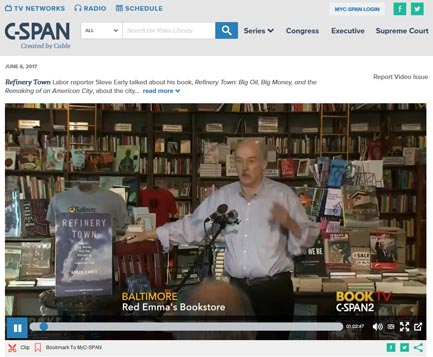 June 6, 2017 June 6, 2017
Refinery Town Labor reporter Steve Early talked about his book, Refinery Town: Big Oil, Big Money, and the Remaking of an American City, about the city of Richmond, California, and the efforts by its citizens to transform the city and its relationship with Chevron, which dominates the economy there.
Watch the video >> |
| |
|
| |
A Small City's Big Lessons About Progressive Organizing
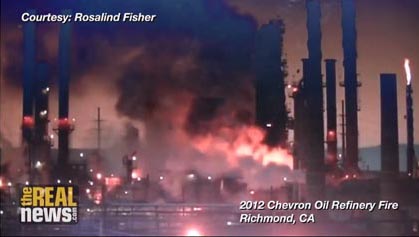 AARON MATÉ: It's The Real News. I'm Aaron Maté. Richmond, California is home to one of the largest oil refineries on the West Coast and also a working-class community that has seen many struggles. Chevron, the city's largest employer, has been responsible for hundreds of industrial accidents in the area, including major fires, spills, explosions, and air contamination. At the same time, for decades, it's maintained a controlling influence over the city's electoral politics. However, in recent years, the community at Richmond has fought back, organizing to raise the local minimum wage and demand fair taxation from Big Oil. AARON MATÉ: It's The Real News. I'm Aaron Maté. Richmond, California is home to one of the largest oil refineries on the West Coast and also a working-class community that has seen many struggles. Chevron, the city's largest employer, has been responsible for hundreds of industrial accidents in the area, including major fires, spills, explosions, and air contamination. At the same time, for decades, it's maintained a controlling influence over the city's electoral politics. However, in recent years, the community at Richmond has fought back, organizing to raise the local minimum wage and demand fair taxation from Big Oil.
This fight is chronicled in the new book, Refinery Town: Big Oil, Big Money, and the Remaking of an American City. Its author is Steve Early, who, for the past 45 years, has been an organizer, lawyer, and labor activist. I recently sat down with Steve Early in our Baltimore studio.....Interview and Video >>
|
| |
|
| |
Steve Early on Richmond’s Political Transformation

Populist Coalition Beats Back Chevron in California Refinery Town
Sunday, February 12, 2017By Mark Karlin, Truthout | Interview
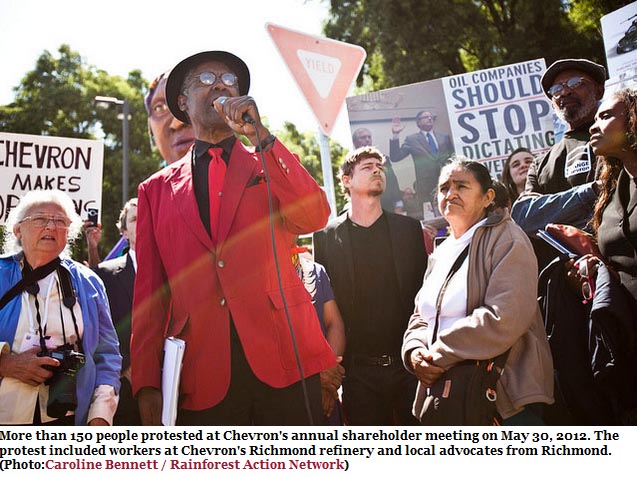
|
 “Corporate Free” Richmond Candidates Moving Up “Corporate Free” Richmond Candidates Moving Up
Since 2004, members of the Richmond Progressive Alliance (RPA) have won ten out of the sixteen city council and mayoral races they have contested in their majority minority city of 110,000.
Read the Full Story >> |
 Read all about it! Read all about it!
Making change in a California Refinery Town: limits and possibilities of radical local politics
See link below to a wide-ranging exchange with Steve Early, author of Refinery Town: Big Oil, Big Money, and the Remaking of American City (Beacon Press, 2017) and Mike Parker, a leading activist in the Richmond Progressive Alliance (RPA), whose electoral success is described in Early's book. This interview was conducted by Michael D. Yates, author, economist, labor educator and Editorial Director of Monthly Review Press. It was published April 12, 2017 in Counterpunch.
Read the full interview here.
http://www.counterpunch.org/2017/04/12/the-promises-and-limitations-of-radical-local-politics/
The Peter Collins Show
https://www.peterbcollins.com/2017/06/22/in-depth-interview-author-steve-early-details-progressive-renaissance-led-by-green-party-mayor-in-richmond-ca/
Thorne Dreyer, Rag Radio, KOOP, Austin, Texas
https://archive.org/details/RagRadio2017-07-28-SteveEarlyNickLicata
Redeye Radio, Vancouver, B.C.
https://www.spreaker.com/user/redeye/california-refinery-town-takes-on-chevron
Corporations and Democracy, Annie Esposito and Steve Scalmanini http://www.thealliancefordemocracy.org/audio/candd2017-06-13.mp3
Ralph Nader Radio Hour
https://ralphnaderradiohour.com/whats-so-funny-about-palestine/
Locus Focus/KBOO
http://www.kboo.fm/media/56601-refinery-town
Old Mole Variety Hour/KBOO
http://kboo.fm/media/56562-people-versus-chevron-richmond
Populist Dialogues (Interview with David Delk)
https://www.youtube.com/watch?v=QVggCRIgQEY&t=2s
*The Economist / Taft Harley Prudential Retirement: Union Perspectives
http://tafthartley.prudentialretirement.com/video-steve-early.aspx
*KALW’s Your Call (Rose Aquilar)
http://kalw.org/post/your-call-how-did-richmond-become-laboratory-progressive-politics
*KPFA’s Letters & Politics (Mitch Jeserich)
https://itunes.apple.com/us/podcast/kpfa-letters-and-politics/id406769844?mt=2
*C-SPAN’s BOOK TV
https://www.c-span.org/video/?423076-2/refinery-town
*The American Scholar’s Smarty Pants podcast. https://theamericanscholar.org/from-cote-divoire-to-the-california-coast/#.WKxQkX9lwus
*All Together Now (Progressive Radio Network) http://prn.fm/together-now-02-09-17/
*Radio Curious on KZYX
http://www.radiocurious.org/2017/02/21/early-steve-remaking-an-american-city/.
*Rising Up With Sonali (KPFA and other Pacifica stations)
http://www.risingupwithsonali.com/refinery-town-big-oil-big-money-and-the-remaking-of-an-american-city/.
*The Zero Hour with R.J. Eskow
http://www.thisisthezerohour.com/ and https://www.youtube.com/watch?v=3o2AIhvaXwI
KCRW’s To the Point (National)
https://www.kcrw.com/news-culture/shows/to-the-point/a-growing-debate-over-presidential-mental-health
KCUI’s Ask A Leader
http://askaleader.com/?p=893
Against The Grain, KPFA
https://kpfa.org/episode/against-the-grain-april-24-2017/
Heartland Labor Forum
http://www.kkfi.org/program-episodes/many-millennials-socialists-refinery-town-2/
Alternative Visions, Progressive Radio Network
https://alternativevisions.podbean.com/e/alternative-visions-america’s-crisis-what-can-be-done-042117/
Brain Labor Report, KSKQ
http://www.kskq.org/index.php/127-brain-labor-report/4181-brain-labor-report-3-29-steve-early
Cheryl Fields & David McClure, WOLB, Lunch with Labor
https://wolbbaltimore.com/2052275/lunch-with-labor-episode-49/
Erica Mann, KPFK, Voices From The Frontline
http://archive.kpfk.org/mp3/kpfk_170905_150030voicesfromfrontlines.MP3
Ruth Needleman and Lorell Kilpatrick, WLTH 1370, Issues and Answers,
http://www.ustream.tv/recorded/10777813
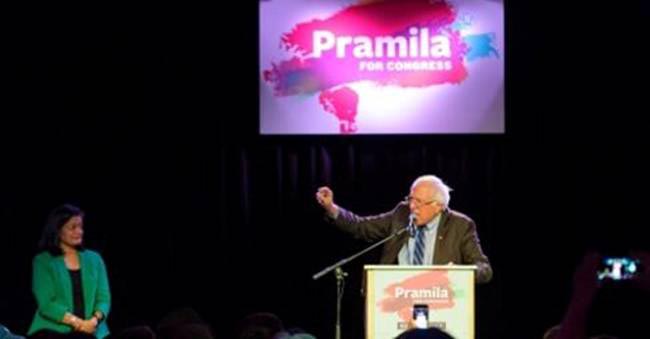
Bernie Sanders’ New Book Offers a Roadmap for Progressives to Challenge the Establishment
By Steve Early and Rand Wilson, IN THESE TIMES
Pramila Jayapal, an immigrant rights activist endorsed by Bernie Sanders, won election to the U.S. House of Representatives from Washington State, along with more than fifty other Our Revolution endorsed candidates around the country. For details on this and a report on Sanders new book, see: http://inthesetimes.com/article/19701/bernie-sanders-new-book-offers-a-roadmap-to-challenge-the-establishment/INTHESETIMES.COM
THE CHEVRON WAY: HOW BIG OIL POLLUTES CALIFORNIA POLITICS
by Steve Early in Beyond Chron November 21, 2016
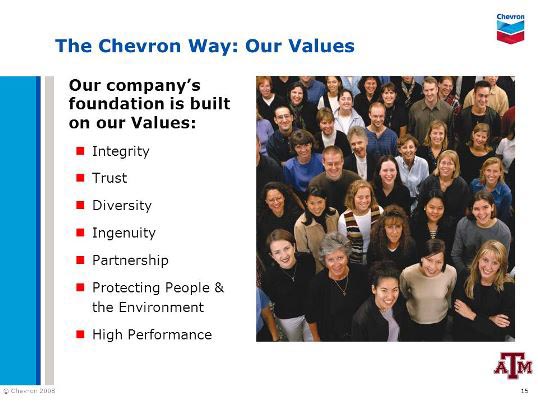
In the two election cycles prior to 2016, the global energy giant Chevron spent more than $4 million on city council or mayoral races in Richmond, CA. Big Oil’s independent expenditures were so large two years ago that they drew widespread condemnation as a particularly egregious example of the unrestricted corporate spending unleashed by the Supreme Court’s Citizen’s United decision.
For the rest of this article, see:http://www.beyondchron.org/chevron-way-big-oils-vacation-east/ |
| |
|
| |
 What a California Refinery Town Can Teach America What a California Refinery Town Can Teach America
http://billmoyers.com/story/california-refinery-town-can-teach-america/
A soon-to-be-published book by a longtime labor organizer chronicles how a grass-roots democracy movement overcame corporate money. |
| |
|
| |
SHOULD GREENS (AND OTHER LEFTIES) GO LOCAL NOW?

by Steve Early in Beyond Chron
November 10, 2016
(http://www.beyondchron.org/greens-go-local/ |
| |
|
| |
 Striking Big Oil: A Refinery Town View of “Blue-Green” Alliance Building & Just Transitioning Striking Big Oil: A Refinery Town View of “Blue-Green” Alliance Building & Just Transitioning
Social Policy, November-December, 2016 http://www.socialpolicy.org/component/content/article/4-latest-issue/810-striking-big-oil-a-refinery-town-view-of-blue-green-alliance-building-a-just-transitioning
By STEVE EARLY,
There are many industries in America that put production and profits before safety but few with deeper pockets or greater environmental impact than Big Oil. So what better potential partners for “blue-green alliances” than refinery labor and people in “frontline communities” long pitted against each other by energy giants like Chevron? |
| |
|
| |
Top Cop
As police chief of gritty Richmond, California, Chris Magnus embraced Black Lives Matter, all but eliminated fatal shootings by police, and cut the homicide rate in half.
by Steve Early in Washington Monthly, November-December, 2016
http://washingtonmonthly.com/magazine/novemberdecember-2016/top-cop/
Boldly breaching the thin blue line: Police chief Chris Magnus became an overnight internet sensation at this protest in2014, shortly after the police shooting of Michael Brown in Ferguson, Missouri. |
| |
|
In Bay Area Refinery Town:
Berniecrats & Clintonites Clash Over Rent Control
 October 21, 2016 October 21, 2016
By Steve Early
In June, Vermont Senator Bernie Sanders wound up his presidential primary campaign by urging his supporters to run for office themselves.
For more on the city council race in Richmond, CA. by two candidates still feeling the Bern, see:
http://www.counterpunch.org/2016/10/21/in-bay-area-refinery-town-berniecrats-clintonites-clash-over-rent-control/ |
| |
|
| |
Seattle Lessons for Bernie Sanders Backers?
 June 7, 2016 June 7, 2016
By Steve Early
As the 2016 primary season draws to an end and Bernie Sanders backers look beyond next month’s Democratic convention in Philadelphia, many who have “felt the Bern” have their eye on local politics.Hundreds, if not thousands, will be heeding the call of Minnesota Congressman Keith Ellison, a Sanders’ endorser and convention delegate. “We need people running for school boards,” Ellison told the New York Times in May. “We need people running for City Council. We need people running for state legislatures. We need people running for zoning boards, for park boards, to really take this sort of message that Bernie carried and carry it in their own local communities.”...
See the rest of this review >> |
| |
|
| |
A Tale of Two Teamsters: Building a Community-Minded Union in Mid-Century St. Louis
 May 10, 2016 May 10, 2016
By Steve Early
Long before the birth of Teamsters for a Democratic Union in the mid-1970s, the International Brotherhood of Teamsters (IBT) was hostile terrain for creating model local unions. In the 1930s, warehouse workers and drivers in Minneapolis revitalized Teamsters Local 574, under the leadership of Farrell Dobbs and other labor radicals. They organized widespread community support for a citywide general strike—now much celebrated by labor historians. After its success, Dobbs and other Teamster militants helped organize over-the-road trucking throughout the mid-west.
See the rest of this article >> |
| |
|
| |
THE PRESIDENTIAL RACE COMES TO RICHMOND

May 10, 2016
by Steve Early, Beyond Chron,
 Residents of Richmond and other California refinery towns have learned, over time, to be wary of state and local officials too closely tied to companies like Chevron. Residents of Richmond and other California refinery towns have learned, over time, to be wary of state and local officials too closely tied to companies like Chevron.
Politicians who benefit from “independent expenditures” on their behalf or direct campaign donations from oil producers or, their lobbying group, the Western States Petroleum Association (WSPA) tend to be less enthusiastic about protecting the environment by reducing fossil fuel dependence.
See the rest of this article >> |
| |
|
| |
 “Nat Bates For Mayor:” A Richmond Pol’s Last Hurrah With Major Funding From Chevron “Nat Bates For Mayor:” A Richmond Pol’s Last Hurrah With Major Funding From Chevron
by Steve Early
March 29, 2016
The city of Richmond’s next municipal voting is less than eight months away. But memories of our last election—one of the most expensive in history– remain fresh in the minds of many participants. For Refinery Town residents whose recollections are fading, we now have a fascinating 90-minute video history of that campaign.
Beyond Chron |
| |
|
| |
Labor, The Left, & Sanders
Posted at ZNet, February 17, 2016
Michael Albert, co-founder of ZNet and Z Magazine:
You've been working on the Sanders Campaign for some months now?
What made you each decide to join the effort?
Steve Early: "For me, assisting Bernie’s campaign is, first of all, a matter of personal solidarity and political reciprocity. During his 25 years in the House and Senate, Sanders used his public office to help workers get better organized, in their workplaces and communities, in a fashion quite unlike any Democrat I ever encountered as a union rep in New England.....That's why IBEW and CWA telephone locals went all out for Bernie in Iowa and New Hampshire this winter and the CWA national union, after a binding poll of its membership, officially endorsed Bernie's campaign. I've been active in CWA since 1980 and haven't voted for a single one of its endorsed presidential candidates during that time. Finally, this year, the union had a candidate really worth endorsing and supporting..."
For the rest of this interview, go to: https://zcomm.org/znetarticle/labor-activism-sanders/
|
| |
|
| |
Browsing The Bernie Bookshelf
 January 25, 2016 January 25, 2016
By Steve Early
For those “feeling the Bern,” this may not be the best time to throw another log on the fire, curl up on your couch, and immerse yourself in books about the most popular brand to emerge from Vermont since Ben & Jerry's.
Yet Bernie Sanders' race against HIllary Clinton has triggered a minor book publishing boom that should not be ignored, even on the eve of primary voting in Iowa and New Hampshire....
COUNTERPUNCH.ORG |
| |
|
| |

Should Socialists Support Bernie Sanders?
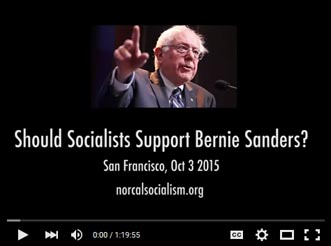 Published on Oct 8, 2015 Published on Oct 8, 2015
The Democratic primary campaign of Bernie Sanders has ignited a new enthusiasm among many who are fed up with the status-quo of politics in the United States. Tens of thousands have joined rallies to hear Sanders decry the billionaire class and call for an end to inequality. Many on the socialist left have embraced the campaign. Others have argued against support for Sanders, calling instead for socialists to organize independently of the Democratic Party.
On Oct 3, 2015 the International Socialist Organization hosted a panel discussion on the question of support for the Sanders campaign and socialist strategy during elections. This is an audio recording of that discussion. (audience comments have been removed.)
Featuring:Steve Early
Steve Early is a Labor for Bernie Volunteer and member of TNG/CWA Local 39521. Early worked as a national union organizer for the Communications Workers of America in New England for nearly 30 year and is the author of Save our Unions (Monthly Review Press, 2014) along with other books about the US labor movement.
|
| |
|
| |

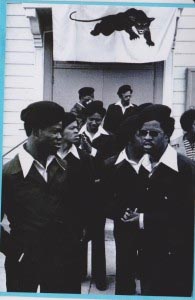 Q & A: The Black Panthers of Richmond Q & A: The Black Panthers of Richmond
September 8, 2015
By Steve Early
In an interview with local journalist Steve Early, Bill Jennings--a Black Panther Party (BPP) activist in Richmond 45 years ago--discusses the Panthers’ local origins and a new feature-length documentary called “The Black Panthers: Vanguard of the Revolution.”
The film opens in Oakland, Berkeley, San Francisco, and San Rafael on Oct. 2.
For the full interview, see: http://richmondpulse.org/2015/09/08/q-a-bill-jennings-on-black-panther-partys-place-in-richmonds-history/
For more on the BPP’s Richmond history, see Early’s forthcoming book, Shelter in Place: Reshaping Politics, Power, and Public Policy in a California Refinery Town (Beacon Press, 2016). |
| |
|
| |

How "Brother" Bernie Is Making Labor's Day
August 25, 2015
By Steve Early
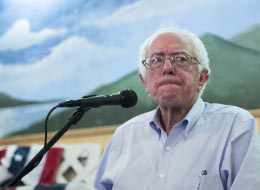 If it wasn't for the Democratic presidential primary race now underway, Labor Day 2015 might be just another annual occasion for union mourning rather than celebration. If it wasn't for the Democratic presidential primary race now underway, Labor Day 2015 might be just another annual occasion for union mourning rather than celebration.
American workers have lost far more battles than they've than won recently. Further legal or political setbacks could be on the way, thanks to the Obama Administration and U.S. Supreme Court.
This spring, President Obama, big business, and their Republican allies in Congress won approval for a "fast-track" vote on the Trans Pacific Partnership (TPP), when that controversial free trade deal is ready for ratification. Labor critics predict the TPP will undermine workers' rights, environmental standards, and efforts to regulate multinational corporate activity....
For rest of the story, see: http://www.huffingtonpost.com/steve-early/how-brother-bernie-is-mak_b_8034112.html |
| |
|
| |
  Self-described socialist and Democratic primary contender Bernie Sanders is turning out record-breaking crowds to hear him call out billionaires and oligarchs. Self-described socialist and Democratic primary contender Bernie Sanders is turning out record-breaking crowds to hear him call out billionaires and oligarchs.
His track record and positions on the issues are closer than any other candidate to what most unions espouse – but when most unions get involved in electoral politics, they want to bet on the winner.
We’ll discuss labor’s divide over the Sanders insurgency with Steve Early, former organizer with the Communications Workers of America, now a journalist and author.
His latest book is Save Our Unions: Dispatches From A Movement in Distress. |
| |
|
| |

What’s the Matter With Indiana?
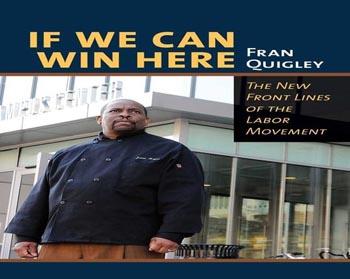 Steve Early Steve Early
June 15, 2015
Amid all that’s terribly wrong with Indiana’s current political direction, Indianapolis Law Professor Fran Quigley finds cause for optimism in his new book, If We Can Win Here: The New Front Lines of the Labor Movement (Cornell University Press, 2015)
According to the author, “Despite a state political climate that proved inhospitable to labor in the right-to-work debate, private sector workers are launching union organizing campaigns across the state’s capital,” and in smaller towns as well."
For the rest of this review, see: http://portside.org/2015-06-16/what’s-matter-indiana |
| |
|
| |

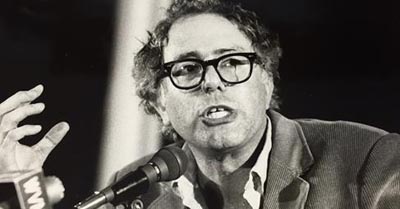 Labor for Bernie Labor for Bernie
Jacobin Magazine, 5/26/15
By Steve Early
When Bernie Sanders comes looking for support in his presidential primary challenge, trade unionists should remember his long history of helping Vermont workers get their act together in strikes, organizing campaigns, and community-labor coalition building. For more on the track record of a true "friend of labor"--who deserves union backing in 2016--see: https://www.jacobinmag.com/2015/05/bernie-sanders-president-primary-hillary/
|
| |
|
| |
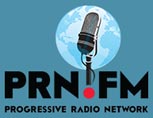
Debating The Bernie Sanders Campaign
By Steve Earely on May 23rd, 2015
 Alternative Visions host Jack Rasmus invited seasoned political activists, Steve Early and Alan Benjamin, to discuss the strategic significance, pro and con, of Bernie Sanders’ recent announcement of his candidacy for US President and run in the Democratic Party primaries against Hillary Clinton. Both Steve and Alan go way back with Bernie to his Liberty Union Party campaigns in the 1970s when Sanders first entered Vermont politics. They take different positions on the merits of Senator Sanders’ chosen path for his presidential campaign...... Alternative Visions host Jack Rasmus invited seasoned political activists, Steve Early and Alan Benjamin, to discuss the strategic significance, pro and con, of Bernie Sanders’ recent announcement of his candidacy for US President and run in the Democratic Party primaries against Hillary Clinton. Both Steve and Alan go way back with Bernie to his Liberty Union Party campaigns in the 1970s when Sanders first entered Vermont politics. They take different positions on the merits of Senator Sanders’ chosen path for his presidential campaign......
The full show is available and downloadable at:
http://www.alternativevisions.podbean.com or at:
http://prn.fm/alternative-visions-bernie-sanders-and-the-organizational-question-in-us-politics-05-23-14/ |
| |
|
| |

How One San Francisco Neighborhood Kept The Forces of Gentrification At Bay: Lessons of The Tenderloin
By Steve Early on May 4, 2015
When British sociologist Ruth Glass first coined the term “gentrification” in 1964, she was describing the process of displacement already underway in London as poor and working class people got forced out of their traditional urban neighborhoods due to an influx of higher-income renters and home-buyers. In the U.S., no city is more closely identified with this same trend than San Francisco, now one of the most expensive housing markets in the country.
Not long ago, San Francisco had many blue-collar neighborhoods, that were affordable and provided easy access to working class jobs. Now, as housing lawyer and community organizer Randy Shaw notes in his new book, The Tenderloin: Sex, Crime and Resistance in the Heart of San Francisco (Urban Reality Press, 2015), much of the city is “virtually off-limits to all but well-heeled residents.”
The only exception to this local displacement trend is a San Francisco neighborhood with a colorful 100-year history of naughtiness and non-conformism..... For the rest of this story, see: http://www.counterpunch.org/2015/05/04/lessons-of-the-tenderloin/ |
| |
|
| |

WHATEVER HAPPENED TO EMPLOYEE FREE CHOICE?
By Steve Early on April 28, 2015
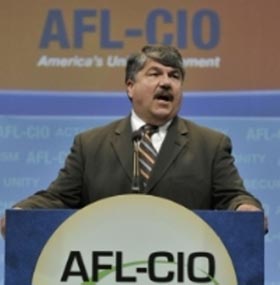 Before President Obama gave up on labor law reform in 2010, the national AFL-CIO and major unions spent several years and many millions of dollars promoting “employee free choice.” Long-overdue statutory reform, based on this concept, would have allowed workers to unionize quickly without as much management interference in their decision to embrace or reject collective bargaining. Before President Obama gave up on labor law reform in 2010, the national AFL-CIO and major unions spent several years and many millions of dollars promoting “employee free choice.” Long-overdue statutory reform, based on this concept, would have allowed workers to unionize quickly without as much management interference in their decision to embrace or reject collective bargaining.
The idea that representation decisions should be left to workers themselves—and that employers should be discouraged from thwarting any exercise of “free choice” in the workplace–was much emphasized throughout labor’s campaign for the Employee Free Choice Act (EFCA)
Long after EFCA died in Congress, the National Labor Relations Board (NLRB) finally issued new rules to shorten the average length of time it takes for workers to get a union vote after petitioning for one. The Board’s expedited election process goes into effect this month and was hailed by national AFL-CIO President Rich Trumka as “modest but important.”
Says Trumka: “Too often, lengthy and unnecessary litigation over minor issues bogs down the election process and prevents workers from getting the vote they want. We commend the NLRB’s efforts to streamline the process and reduce unnecessary delay.”
Unfortunately, Rich Trumka and the NLRB have just put the brakes on union balloting by 700 workers at a hospital in Chico, California. Why did they thwart the fastest possible exercise of employee free choice there?....For details on this sad episode, see: http://www.beyondchron.org/afl-cio-delays-ca-hospital-vote-whatever-happened-to-employee-free-choice/ |
| |
|
| |
Working In These Times
April 22, 2015

VT. Labor Activists Battle Democratic Governor After
"Single-Payer" Setback
By Steve Early
Liz Nikazmerad is a rarity in American labor: a local union president under the age of 30, displaying both youth and militancy. For the last two year years, she has led the 180-member Local 203 of the United Electrical Workers (UE), while working in the produce department of City Market in Burlington, Vermont.
On January 8, when Democratic Governor Peter Shumlin began his third term, Liz Nikazmerad and several hundred others weren’t in Montpelier to applaud his inauguration. Instead, frustrated advocates of health care reform staged a sit-in at the state capitol. They chanted and sang, unfurled banners and refused to leave in protest against Shumlin's abrupt abandonment of the state's single-payer experiment six weeks after his re-election.
“People had fought for this a long time,” Nikazmerad says. “It was a huge win and to have the rug yanked out like that was very upsetting. People were very emotional about it..."
For the rest of this article: see:
http://inthesetimes.com/working/entry/17871/vermont_activists_battle_democratic_governor . . .
|
| |
|
| |
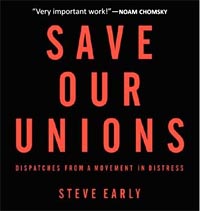 "Fight For Fifteen" campaign discussed on KALW's "Your Call".... "Fight For Fifteen" campaign discussed on KALW's "Your Call"....
by Steve Early
April, 15, 2015 edition of San Francisco public radio show hosted by Rose Aguilar featured Save Our Unions author Steve Early taking calls from listeners and discussing that day's nationwide protest activity by fast good workers.
Here's a link to the show: Your Call: Minimum wage fight, Kenya massacre, Chibok girls. |
| |
|
| |

GOING GLOBAL IN RICHMOND? COALITION SEEKS BENEFITS FROM NEW UC BERKELEY CAMPUS
by Steve Early on April 10, 2015
 Members of AFSCME Local 3299 who in live in Richmond, CA. and work for the University of California in Berkeley have an urgent message for their neighbors: Members of AFSCME Local 3299 who in live in Richmond, CA. and work for the University of California in Berkeley have an urgent message for their neighbors:
“When the university plans a major expansion in our city, we need to get all its promises in writing!’
AFSCME activists base that sound trade union advice on their most recent contract bargaining –and on-going skirmishes–with the UC system. In 2013-14, it took more than a year of difficult negotiations, plus statewide strike activity, to win the collective bargaining agreement that currently covers 8,300 UC service workers.
For the rest of this story, go to http://www.beyondchron.org/going-global-in-richmond-community-labor-coalition-seeks-local-benefit-from-east-bay-expansion-of-uc-b/ |
| |
|
| |
Future Blast Zones?
How Crude-By-Rail Puts U.S. Communities At Risk
 telesur telesur
By Steve Early - March 23, 2015
The transport of petroleum via rail is now a well-known and unwelcome sight in many U.S. and Canadian communities. Unsafe crude-by-rail shipment has resulted in five major train fires and explosions in the last 16 months alone. In addition to these spectacular non-fatal accidents, mostly occurring in uninhabited areas, North America’s most infamous crude-by-rail disaster took the lives of 47 people in July, 2013. That’s when a runaway train—improperly braked by its single-man crew—barreled into Lac-Megantic, Quebec, leveling all of its downtown....
For the rest of this article, see:
http://www.telesurtv.net/english/opinion/Future-Blast-Zones-How-Crude-By-Rail-Puts-U.S.-Communities-At-Risk-20150323-0007.html. |
| |
|
| |
TONY MAZZOCCHI’S SPIRIT HAUNTS BIG OIL AGAIN
by Steve Early, Beyond Chron February 4, 2015
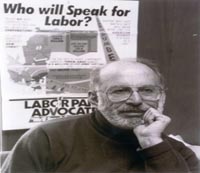 Twelve years ago, America’s leading advocate of occupational health and environmental safety succumbed to pancreatic cancer. Twelve years ago, America’s leading advocate of occupational health and environmental safety succumbed to pancreatic cancer.
In the U.S., where the influence of organized labor has long been contracting, the death of a former trade union official is often little noted. Yet Tony Mazzocchi was no ordinary labor leader. His passing from the scene, at age 76, was widely recognized and correctly mourned as a great loss for the entire union movement.As a top strategist for the Oil, Chemical and Atomic Workers (OCAW), Mazzocchi pioneered alliances between workers concerned about job safety and health hazards and communities exposed to industrial pollution generated by companies like Shell, Chevron, and Mobil.
In 1973, members of the OCAW (who are now part of the United Steel Workers) conducted a national contract campaign and four-month strike at Shell Oil over workplace safety rights and protections. To win—or even just battle Big Oil to a draw—workers had to join forces with the very same environmental organizations long demonized by the industry as the enemy of labor and management alike. Four decades later, echoes of that struggle could be heard on the refinery town picket-lines that went up in northern California, Texas, Kentucky, and Washington state this week......
For rest of article, go to: http://www.beyondchron.org/spirit-tony-mazzocchi-haunting-big-oil/ |
| |
|
| |
Labor Intellectuals Sound Alarm About Union Decline
By Steve Early, January 28, 2015
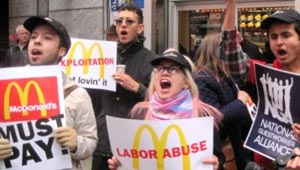 The well-documented decline of U.S. union membership, bargaining clout, and political influence has more than workers worried. Two of America’s better known left or liberal commentators on labor relations have weighed in with new books that lament the current state of working class organization and suggest various methods of resuscitation.... The well-documented decline of U.S. union membership, bargaining clout, and political influence has more than workers worried. Two of America’s better known left or liberal commentators on labor relations have weighed in with new books that lament the current state of working class organization and suggest various methods of resuscitation....
For rest of this essay/review on new books by Tom Geoghegan and Stanley Aronowitz, see: http://www.telesurtv.net/english/opinion/U.S.-Labor-Intellectuals-Sound-the-Alarm-about-Union-Decline-20141228-0020.html |
| |
|
| |
 Save Our Unions featured on WLRN's Tropical Currents.... Listen >> Save Our Unions featured on WLRN's Tropical Currents.... Listen >>
By JOSEPH COOPER, BONNIE BERMAN, RICHARD IVES & PAUL LEARY
January 7, 2015: Wednesday’s Topical Currents is a visit by journalist, labor activist and attorney Steve Early
He’s chronicled the continuing discord between the growing numbers of conservative lawmakers and corporate influence upon the American labor movement. Early addresses the weakening of collective bargaining, the unraveling of healthcare reform, and reduced employee benefits in his book,SAVE OUR UNIONS: Dispatches From a Movement in Distress. That’sTopical Currents Wednesday at 1 pm. |
| |
|
| |

Shumlin’s Surrender:
Vermont Democrats Go South On Single Payer
by STEVE EARLY - December 19-21, 2014
“Vermont…is the only state with universal single-payer health coverage for its residents.”
–James Fallows in The Atlantic, April, 2014
For nearly four years, Vermont Governor Peter Shumlin has been basking in the glow of press accolades like the one above. Unfortunately, what was often misreported nationally as a done deal was far from it in Montpelier, the state’s capital.
Top Democrats in the legislature were, in reality, not enthusiastic about providing tax-supported universal coverage. Shumlin’s postponement of key financing decisions until after his re-election this fall reflected his own ambivalence about the cost and complexity of the project.
On Wednesday, December 17, the governor called a statehouse press conference to make a “major announcement.” That turned out to be good news for single payer foes locally and nationally—and bad news for campaigners to make “health care a human right"...
For rest of this article, see: HTTP://WWW.COUNTERPUNCH.ORG/2014/12/19/VERMONT-DEMOCRATS-GO-SOUTH-ON-SINGLE-PAYER/ |
| |
|
| |

Meet the Group of Feisty Urban Progressives Who
Want to Transform the Country One City at a Time
By Steve Early | December 10, 2014

A century ago, working-class radicals frustrated with the pace of change often scoffed at their more patient comrades in city government, calling them “sewer socialists.” The latter, however, numbered in the hundreds, and, in their heyday, were quite influential in cities both large and small. After being elected to municipal positions on the Socialist Party ticket, they labored mightily to improve local services, from public sanitation to street repair. They even encroached on private markets by expanding public housing and experimenting with municipal ownership of utilities.
The national expansion of popular democracy sought by these left-wing reformers was, sadly, never achieved under their party banner. But several decades later, their many ideas for putting government to work for the people found traction during the New Deal. Programs to promote social equality and economic opportunity--first tested at the state or local level--became a Depression-era lifeline for millions of Americans nationwide.
In the twenty-first century, many on the left still yearn for labor and political victories on the scale of the 1930s and the emergence, once again, of federal restraints on the malign impacts of corporate power. While waiting for that second coming, progressive activists have, like the “sewer socialists” of old, been forced to grapple with serious problems—national and even global in nature—at the municipal level instead....
For rest of this article, go to: http://www.thenation.com/article/192537/meet-group-feisty-urban-progressives-who-want-transform-country-one-city-time |
| |
|
| |

December 5, 2014
Economic Update: Labor and Unions
This week's episode provides updates on Ferguson and Portland as symptoms of economic decline, Sen. Bernie Sanders fight for worker co-ops, homelessness in New York City and the rising political left in Greece, Spain and now Ireland. We interview activist and author Steve Early on the present and future of the US labor movement. Finally, we respond to listeners about supply-demand economics and "capturing" government regulators.
See http://truth-out.org/news/item/27821-economic-update-labor-and-unions |
| |
|
| |

November 28, 2014
Police Violence is Not Inevitable: Four Ways a California Police Chief Helped Connect Cops with the Community
“A critical look at any institution with as much power and authority invested in it as the police is probably a good thing.”
by Steve Early
In the wake of Missouri's grand jury decision, a model for better policing and relationships with the community is needed. Richmond, California is an example other cities can learn from.
Published: November 29, 2014 | By Steve Early | YES! Magazine | News Analysis
In the wake of a Missouri grand jury’s decision not to indict Darren Wilson, the police officer who shot and killed Michael Brown, it can be difficult to imagine a place where law enforcement and a racially diverse population work together productively in the United States.
But it’s happening in Richmond, California, a gritty town in the San Francisco Bay Area best known for its massive Chevron refinery and, in previous years, for its high crime rate. While the situation in Richmond isn’t perfect, it is an example other cities can learn from.
Today, violent crime in Richmond is down. In 2013, Richmond had 16 murders—the lowest number in 33 years—and far fewer unsolved homicide cases than in previous years.
Police violence, in particular, is way down. Despite making thousands of arrests each year and confiscating one gun or more every day, the Richmond Police Department has averaged less than one officer-involved shooting per year since 2008.
Police Chief Chris Magnus has been widely credited with enacting the reforms that led to these changes.....
For the rest of this article, see: http://www.yesmagazine.org/peace-justice/police-violence-is-not-inevitable-four-ways-a-california-police-chief-connected-cops-with-communities |
| |
|

WEEKEND EDITION NOVEMBER 7-9, 2014
Crude But Not Effective:
Big Oil’s “Air War” Fails to Sink Richmond Progressives
by Steve Early
RICHMOND, CA
Election day, 2014, was not ending well for Nat Bates, a mayoral candidate in this largely non-white city of 100,000 long dominated by Chevron. The small crowd of supporters gathered in his storefront campaign headquarters on Macdonald Avenue was beginning to look rather glum. The big box cake, with white icing and lettering proclaiming Bates to be “Our Mayor,” remained unwrapped.
The 83-year old African-American Democrat, who has been Big Oil’s best friend on the city council, had every reason to expect early returns much better than the numbers his campaign manager was posting on the wall by 10:30 p.m. on Tuesday evening.
For many weeks, Richmond voters have been bombarded with full-color brochures touting Bates’ four decades of business friendly leadership. His final mailer listed more than fifty local ministers as campaign supporters. They were joined by U.S. Senator Dianne Feinstein, former San Francisco Mayor Willie Brown, Contra Costa County Building Trades leaders, Richmond police and firefighters’ unions, and the Chamber of Commerce.
Nat Bates gazed down on the citizenry from countless billboards, like a ubiquitous successor to “Big Brother” in George Orwell’s dystopian novel, 1984. His ads popped up on the inter-net, on local TV and radio stations; large numbers of Richmond voters got YouTube videos featuring his homilies. On election day, the Bates campaign—or Moving Forward, Chevron’s PAC– deployed paid canvassers and sign-holders, plus free rides to the polls. An impressive number of Richmond residents sported “Bates for Mayor” signs on their lawn.....
For the rest of this article, see: http://www.counterpunch.org/2014/11/07/big-oils-air-war-fails-to-sink-richmond-progressives/ |
| |
|
| |
October 28, 2014

Working In These Times
Hawaiian Health Care Workers Resist Kaiser Pension Take-Away
By Steve Early
Mary Ann Barnes, the newly arrived president of health care giant Kaiser Permanente in Hawaii, recently informed hospital workers that the world figure she most admires is the late Mother Teresa—because of “her humanity and selflessness.”
Pictured wearing a lei around her neck, Barnes explained in the company newsletter that her top management priority “is to make sure that the work environment is as good as it can be … so that everyone can love what they do.”
For spreading such good island vibes, Barnes earns nearly $1 million a year. Like other top Kaiser executives on the mainland, she’s eligible for multiple pension plans.
On September 24, several hundred members of Unite Here Local 5, including those who work at Kaiser clinics and hospitals, tried to meet with Barnes about their pensions....
For rest of this story, see: http://inthesetimes.com/working/entry/17292/hawaii_workers_kaiser_permanente |
| |
|
| |
October 27, 2014

Lessons for North American Labour from Workplace Organizing Abroad
Review of New Forms of Worker Organization: The Syndicalist and Autonomist Restoration of Class-Struggle Unionism, edited by Immanuel Ness, (Oakland, CA.:PM Press, 2014)
By Steve Early
In a widely-reported speech last year, AFL-CIO president Rich Trumka declared that the US "system of workplace representation is failing to meet the needs of America's workers." To reverse this longstanding trend, Trumka recommended "new models for organizing workers" that don't focus exclusively on establishing collective bargaining relationships. In the run-up to the AFL-CIO convention in 2013, he created a committee of labour historians to advise him about how such "new and forgotten methods of organizing" could be implemented Meanwhile, local central labour councils were encouraged to hold "listening sessions" as part of a pre-convention drive "to come up with more viable union models." At the convention itself, Trumka pledged AFL-CIO support for "any worker or group of workers who wants to organize and build power in the workplace."
The workplace experiments embraced, so belatedly last year, by mainstream labour in the US reflect a broader conception of unionism long championed by the labor left]. AFL-CIO critics like sociologist and former organizer Stanley Aronowitz argued years ago that union building should not be defined -- or deformed -- by legal certification, employer recognition, or NLRA-influenced union contracts (almost always containing a "no-strike" clause). Now, as radical historian Staughton Lynd notes in his Forward to New Forms of Worker Organization, "alternative unionism" is much in vogue. In the fast food industry and at Wal-Mart, it has found expression, most prominently, among low-wage workers. Their widely publicized protest strikes in 2013-14 often resemble labour's pre-NLRA skirmishing with management more than post-war disputes leading to a signed contract settlement....
For rest of this review, go to: http://newsocialist.org/771-lessons-for-north-american-labour-from-workplace-organizing-abroad |
| |
|
| |
October 4, 2014

Interview With Healthcare-Now
About Labor and Single Payer Healthcare
Question 1: Both your new book Save Our Unions: Dispatches From a Movement in Distress - and your previous one, The Civil Wars in U.S. Labor - draw on your experience as a union negotiator and longtime single payer activist. In 2008, liberal foundations, major unions, and the AFL-CIO created and financed Health Care for American Now! (HCAN). This lobbying coalition had a name similar to ours but it soon distanced itself from the goal of single payer. In retrospect, what impact did HCAN have on labor’s quest for a better health care system?
I think HCAN “settled short” and was too compliant with Obama Administration goals. It also went in the wrong direction by embracing the notion that our system could be substantially improved by mandating and subsidizing the purchase of private insurance, maintaining employer plans where they still exist, and offering a “public option” as a not-for-profit alternative for the millions of new customers now shopping for coverage in our state-based insurance exchanges.
For rest of interview, see: http://www.healthcare-now.org/steve-early-speaks-with-us-about-labor-and-single-payer-healthcare |
| |
|
| |

WEEKEND EDITION OCTOBER 10-12, 2014
Coming To Richmond & Oakland Next Week:
Sanders & Kucinich: Pioneering Progressive Mayors
by Steve Early
If you’re Gayle McLaughlin, the embattled Green mayor of Richmond, CA.--now termed out but running for city council--or Dan Siegel, the radical labor lawyer challenging an incumbent mayor in nearby Oakland, who can rally the troops better than a former mayor who was a pioneering municipal reformer?
Both East Bay candidates hope to generate home-stretch campaign cash and volunteers, with the help of two out-of-town guests, at upcoming public forums and related fundraisers in their respective California cities.
On Oct. 16, McLaughlin is hosting Bernie Sanders, former four-term mayor of Burlington, Vermont, at a “Town Meeting” in Richmond, preceded by a reception at her downtown campaign headquarters. Two days later in Oakland, Siegel is bringing in Dennis Kucinich, a one-term mayor of Cleveland.
Sanders and Kucinich are, of course, both better known nationally for their successful post-city hall careers, which gave them a platform to make past or present forays into presidential politics.....For rest of this article, go to: http://www.counterpunch.org/2014/10/10/sanders-kucinich-pioneering-progressive-mayors/ |
| |
|
| |
Beyond Chron,10/23/14
ANDREW YOUNG IN RICHMOND: PROPHET OF URBAN RENEWAL OR BIG OIL’S REVEREND FOR RENT?
by Steve Early
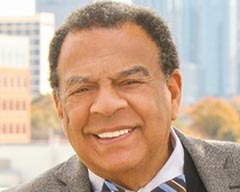 In his remarkable six decade career in public life, 82-year old Andy Young has been many things to many people: civil rights movement minister and courageous ally of Dr. Martin Luther King, Democratic Congressman from Georgia, U.S. emissary to the United Nations under President Jimmy Carter, two-term mayor of Atlanta in the 1980s, and then leader of the National Council of Churches. In his remarkable six decade career in public life, 82-year old Andy Young has been many things to many people: civil rights movement minister and courageous ally of Dr. Martin Luther King, Democratic Congressman from Georgia, U.S. emissary to the United Nations under President Jimmy Carter, two-term mayor of Atlanta in the 1980s, and then leader of the National Council of Churches.
On Monday night, he appeared before a largely African-American crowd at a “community dinner” in Richmond. It was sponsored by a 501 (c) (4) organization known as For Richmond, which dispenses grants to local non-profits like the YMCA. Young’s appearance showcased his most recent incarnation as a skilled, if not uncontroversial, friend of private enterprise, including some of the biggest firms in the world. The timing of his visit was not unrelated to Richmond’s upcoming municipal elections.
In advance publicity for the dinner, the guest speaker was identified as “Ambassador Andrew Young.” That’s a title he lost in 1979, when his United Nations-based outreach to Palestinian critics of Israel led to his forced resignation from the Carter Administration. Instead of dwelling on old war stories about his “mobilization of the Third World in the interests of the United States of America,” Young regaled his Richmond audience with colorful, if narcissistic, tales of economic revival in Atlanta under his city hall leadership.
In Richmond on Nov. 4, voters face a stark choice between two local mayoral candidates who have conflicting ideas about how to sustain Richmond’s recent renaissance—and even disagree on whether there has been one. Both contenders to replace Green mayor Gayle McLaughlin—city council members Nat Bates and Tom Butt–were present to hear Young’s thoughts about creating “a global community of peace, prosperity, and inclusion.”
For rest of this article, see: http://www.beyondchron.org/andrew-young-richmond-prophet-urban-renewal-big-oils-reverend-rent/ |
| |
|
| |
Beyond Chron, September 16, 2014
CHEVRON SOUNDS ALARM AGAINST
EAST BAY “ANARCHISM”
by Steve Early
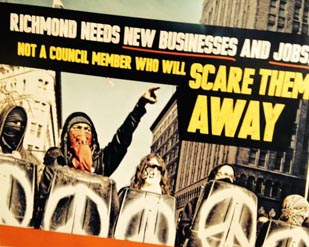 One of the great things about living near Chevron’s big East Bay refinery—yes, the one that caught fire and exploded two years ago—is its system of early warnings about new disasters about to befall Richmond. One of the great things about living near Chevron’s big East Bay refinery—yes, the one that caught fire and exploded two years ago—is its system of early warnings about new disasters about to befall Richmond.
In our post-Citizens United era, the nation’s second largest oil producer is now free to spend $1.6 million (or more, if necessary) on direct mail and phone alerts, designed to keep 30,000 likely voters fully informed about threats to their city.
During the last week, glossy mailers from a Chevron-funded group called “Moving Forward” have been flowing our way, at the rate of one or two per day—almost seven weeks before Election Day.
And, then, just to make sure that Chevron’s urgent message is getting through, we’ve also been called by pollsters. They claim to be surveying opinion about Richmond politics, but actually just recite the contents of these same Moving Forward mailers over the phone.
My favorite manifestation of this negative campaigning involves a Latino candidate for Richmond City council. His name is Eduardo Martinez and remembering the Eduardo part is important. By some strange coincidence, Moving Forward—the Chevron-backed “Coalition of Labor Unions, Small Businesses, Public Safety and Firefighters Associations”—is backing another Martinez for city council whose first name is Al and who is apparently not a public safety threat.....
For rest of this article, see: http://beyondchron.org/chevron-sounds-alarm-east-bay-anarchism/ |
| |
|
| |
In These Times, September 8, 2014
Railroad Conductor: ‘Railroading Has Changed So Much’
By Steve Early
In Working, Terkel interviewed Bill Norworth, a railroad worker for fifty-three years who had recently retired as a locomotive engineer on the Chicago Northwestern Railroad . . . Forty-two years later, Brian Lewis talked to In These Times about his job as a Union Pacific Railroad conductor, which he has just retired from after 36 years in the industry . . . See the full story at http://inthesetimes.com/working/entry/17134/railroad_conductor_working_40
|
| |
|
| |
WORKING IN THESE TIMES, SEPTEMBER 1, 2014
Labors Open Shop Organizing Challenge
By Steve Early
For many years, American unions have been trying to “organize the unorganized” to offset and, where possible, reverse their steady loss of dues-paying membership. In union circles, a distinction was often made between such “external organizing”—recruiting workers who currently lack collective bargaining rights—and “internal organizing,” which involves engaging more members in contract fights and other forms of collective activity aimed at strengthening existing bargaining units.
Thanks to the growing success of corporate-backed “right-to-work” initiatives, however, these two forms of union functioning have become fused together. Virtually all labor organizations face the expanded challenge of recruiting and maintaining members in already unionized workplaces, where the decision to provide financial support for the union has, for better or worse, become voluntary. (Some left-wing critics of “contract unionism” have long argued that automatic deduction of dues by employers for their union bargaining partners, make the latter overly dependent on management and less responsive to rank-and-file workers.)
Throughout the country, labor foes have succeeded in limiting the ability of unions to collect dues—or the equivalent in “agency fees”—from the 16 million workers they are legally certified to represent. In the private sector, 24 states now have an “open shop,” which means that union membership or fee-paying by non-members cannot be required in contracts with employers, including, most recently, those operating in Michigan and Indiana.
In the public sector, the parallel legal and political assaults on “union security” agreements and automatic deduction of dues or fees from government employee paychecks have unfolded in those two states, neighboring Wisconsin, and every state with recently created bargaining units for home-based direct care providers......Continued at:
http://inthesetimes.com/working/entry/17125/for_labor_an_open_shop_doesnt_have_to_mean_closed_doors |
| |
|
| |
Labor Day-related radio interviews with Steve Early discussing Save Our Unions with anti-war activist Cindy Sheehan and Ian Williams, host of Catskill Review of Books
|
| |
|
| |
Social Policy, Summer, 2014
Building A Labor Base For Third Party Campaigning:
Union Member Recruitment by Vermont Progressives
By Steve Early
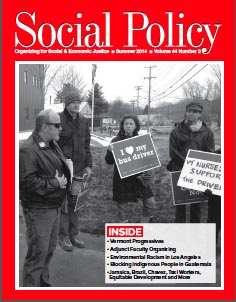 As labor-backed independent electoral efforts proliferate around the country, many activists are looking to the example of the Vermont Progressive Party (VPP). More than any other third-party formation in the country, the VPP has campaigned successfully for state legislative seats and municipal office, while building union support and pressuring corporate Democrats from the left. As labor-backed independent electoral efforts proliferate around the country, many activists are looking to the example of the Vermont Progressive Party (VPP). More than any other third-party formation in the country, the VPP has campaigned successfully for state legislative seats and municipal office, while building union support and pressuring corporate Democrats from the left.
Over the last three decades, Vermont Progressives have been able to woo local labor organizations away from their previous knee-jerk support for mainstream party candidates. These efforts have produced an influx of younger labor activists into the leadership of the VPP, who are now recruiting more of their fellow union members to run against Vermont politicians who prove hostile or indifferent to working class concerns.
What distinguishes the VPP from almost all state and local Democratic Party organizations, backed by labor elsewhere, is its year-round engagement withgrassroots labor causes and campaigns, as well as legislative/ political issues like single-payer health insurance. These non-electoral activities, plus the emergence of homegrown VPP leaders and candidates who have been workplace organizers and local union officers, helps to build VPP connections with the local labor movement.
VPP candidates have taken a leaf from Bernie Sanders’ four decades of labor engagement and advocacy—first, as Burlington mayor, then Vermont’s lone congressman, and now junior U.S. senator. They have distinguished themselvesfrom their Democratic and Republican Party opponents by focusing, in Sanders-like fashion, on economic justice issues, rather than potentially divisive social questions. Unlike many Democrats, VPP office-holders provide active strike support, as they did during a Burlington bus drivers’ walkout earlier this year. Progressive Party members also initiate or join community-based campaigns to defend union jobs, while freely criticizing the labor relations record of Democrats involved in negotiations with teachers, state workers, and other public employees. According to Traven Leyshon, a VPP activist and former secretary-treasurer of the Vermont AFL-CIO, “Local labor leaders are now willing to support Progressive candidates over Democrats—when they’re credible—because of such pro-labor stances.”
For the rest of this report, see: http://www.socialpolicy.org/component/content/article/4-latest-issue/680-union-member-recruitment-by-vermont-progressives |
| |
|
| |
 |
Labor journalist and former Communications Workers of America staffer Steve Early. (Monthly Review Press) |
Steve Early on Labor Reporting:
"Unions Can Be Thin-Skinned About Criticism"
BY MIKE ELK
Labor journalist and former Communications Workers of America staffer Steve Early. (Monthly Review Press)
Since the 1970s, Steve Early has produced more than 300 pieces of labor journalism for publications as varied as the New York Times, The Boston Globe, The Nation, LaborNotes and In These Times. Throughout his career, Early has covered stories of dysfunction and corruption within unions that many labor reporters are afraid to touch out of fear of upsetting high-level union sources.
At time when the labor beat was disappearing from mainstream publications, Early’s writing formed a valuable body of work that inspired many young writers—myself included—to stick with the profession through its highs and lows.
Early sat down with me to discuss his new book, Save Our Unions: Dispatches From a Movement in Distress, out this spring from Monthly Review Press........
For the rest of this book-related interview, see:
http://inthesetimes.com/working/entry/16764/steve_early_on_labor_reporting_unions_can_be_thin_skinned_about_criticism |
| |
|
| |
SEND IN A SUB: LIFE IN THE BLACKBOARD JUNGLE
“We substitute teachers like to think of ourselves as the marines of the public education system. Whenever a breach opens in our nation’s educational front lines, off we go: The few, the brave, the stupid.” – From Tom Gallagher’s SUB: My Years Underground in America's Schools
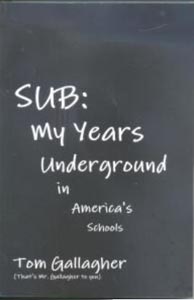 By Steve Early By Steve Early
Thirty years ago, there was no better progressive state legislator in Massachusetts than Tom Gallagher, who migrated to Beacon Hill after graduating from Boston College and working as a part-time public school teacher.
In 1980, Gallagher won a Democratic primary in the Allston-Brighton section of the city in September. Thanks to Boston being a one party town, there wasn’t even a token Republican on the ballot in November. As Gallagher recalls in his new memoir, Sub, his personal profile at the time was:
“reasonably normal for a substitute teacher—I was a guy in his twenties sort of waiting for something to happen….So while I had a big deal political job waiting for me in January, I was flat broke and in no position to be looking for other ‘real’ work during the months of October, November, and December. So I returned to subbing for the interim.”
Gallagher was assigned to an inner city Boston school known for its student misbehavior. But his primary concern was “what other people might make of the new state rep thrashing about at the bottom of the educational heap.” Sure enough, a soon-to-be constituent spotted him in the halls and pronounced herself satisfied that she had voted for the right person. “She no doubt figured that anyone willing to set foot in Jeremiah Burke High School (aka “the Jerry”) wasn’t likely to be daunted by anything he encountered later in the Massachusetts House of Representatives.”
For the rest of this review, see: http://beyondchron.org/send-sub-life-blackboard-jungle/ |
| |
|
| |
IN THESE TIMES, MONDAY, JUNE 23, 2014
A Community Policeman Speaks: How ‘Policing Mostly Became a Response to the 911 Call Machine’
By Steve Early
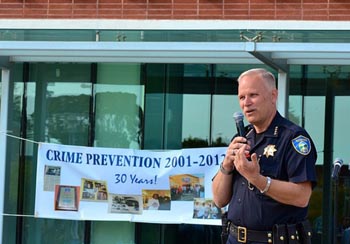 For three years in the early 1970s, journalist Studs Terkel gathered stories from a variety of American workers. He then compiled them into Working, an oral-history collection that went on to become a classic. Four decades after its publication,Working is more relevant than ever. In honor of the book’s 40th anniversary, In These Times asked several regular contributors to conduct interviews with workers employed today in the occupations that Terkel's original interviews described so well. For three years in the early 1970s, journalist Studs Terkel gathered stories from a variety of American workers. He then compiled them into Working, an oral-history collection that went on to become a classic. Four decades after its publication,Working is more relevant than ever. In honor of the book’s 40th anniversary, In These Times asked several regular contributors to conduct interviews with workers employed today in the occupations that Terkel's original interviews described so well.
In Working, Terkel interviewed two Chicago police officers, Vincent Maher and Renault Robinson, both of whom were deeply dissatisfied with their jobs. Maher, a white cop, complained, “We have lost complete contact with the people. They get the assumption that we’re gonna be called to the scene for one purpose—to become violent to make an arrest.” Meanwhile, Robinson, a black cop, was sharply critical of the Chicago Police Department’s emphasis on arresting its way out of crime. Robinson organized the Afro-American Patrolmen’s League “to improve relationships between the black community and the police” because "as policeman, we were the only organized group that could do something about it.”
Forty years later, Chris Magnus, a modern-day veteran of midwestern police work, talked to In These Times about how his profession has changed in cities that value “community policing"—which tries to improve public safety through better working relationships between law enforcement personnel and the people they serve. As chief of police in Richmond, California for the last eight years, Magnus has won widespread approval for helping to reduce the city’s homicide rate and restore local confidence in its police department. Magnus began by paraphrasing London police reformer Robert Peel, whose followers argued, two centuries ago, that “the police are the public and the public are the police.”
The rest of my interview with Chief Magnus continues at: http://inthesetimes.com/working/entry/16855/working_40_police_officer
More of ITT's "Working at 40" stories can be found here. |
| |
|
| |
CounterPunch, June 6, 2014
Less Tenure at the Top?
A Restive Rank and File Seeks New Teacher Union Leadership
by Steve Early
It’s a hard time to be the leader of any union, but those elected by teachers are really on the firing line.
Corporate-backed education reformers, and their political allies want to weaken the collective voice of public school educators. Teacher union bargaining rights or contract protections have come under attack throughout the country. The two labor organizations most directly affected—the National Education Association (NEA) and American Federation of Teachers (AFT)—have tried but failed to appease their political foes, leaving many of their own members questioning the effectiveness of union advocacy and representation.
That growing concern is now fueling union reform struggles within many state and local teachers’ organizations. In several big city branches of the AFT and the 110,000-member Massachusetts affiliate of the NEA, rank-and-file candidates have recently defeated incumbent officials or just narrowly lost contested elections for local leadership positions.
For complete story, please see: http://www.counterpunch.org/2014/06/06/less-tenure-at-the-top/
Radio interview about Save Our Unions:
http://clearingthefogradio.org/monday-june-2-state-of-the-labor-movement-can-it-be-saved/
Published on The Nation, June 9-16, 2014 (http://www.thenation.com)
A Union Man Runs For Mayor
By Steve Early
On a weekday evening in mid-April, longtime United Auto Workers member Mike Parker, now a community organizer in Richmond, California, was among the concerned citizens waiting to speak at a local planning board hearing. The topic was a much-delayed refinery “modernization plan” that the city’s largest employer, Chevron, claims will make its 112-year-old facility cleaner and safer.
Local critics of Chevron, including Parker, rallied before the meeting under the banner of grassroots groups like Communities for a Better Environment. Also on hand, but in smaller numbers, were representatives of Contra Costa County building-trades unions who support the company. They want Richmond to approve the $1 billion project, with few questions asked and no conditions attached, so that 1,000 new construction jobs will be created as soon as possible.
This being an election year, the Chevron officials in attendance paid close attention to what Parker had to say. That’s because, several months ago, Parker announced his own much-contested plan: to run for mayor as part of a citywide slate of progressive candidates that includes Gayle McLaughlin, the current mayor and nationally known California Green, who is prevented by term limits from running for re-election as mayor and will run for city council instead.
“The proposed way that Chevron wants to run its plant is unacceptable,” Parker told the planning board. He pointed out that the modernization project will increase “both local toxic emissions that damage our health and greenhouse gas emissions that damage our planet.” Why, he asked, “would we, as residents of the community, accept more pollution so that Chevron can use dirtier and cheaper oil to make another $500 million in profits every year?”
This is not the kind of talk that brightens the day of Chevron managers, either in gritty Richmond or at the corporate headquarters in upscale San Ramon. That’s why Richmond watchers see a big battle brewing over its future as a much-heralded “progressive city.” For seven years, McLaughlin and her city council allies have tried to change Richmond with a movement-style mix of idealism and activism. Backed by the Richmond Progressive Alliance (RPA), a coalition of grassroots groups and activists, McLaughlin's administration has mounted brave challenges to powerful business interests, from banks to Big Oil. Now, as municipal elections loom in the fall, the business community—led by America’s third-most-profitable company, Chevron—wants to make a political comeback by defeating those who've curbed its influence.
For the rest of this article, go to: http://www.thenation.com/article/179949/can-big-oil-retake-richmond-california
For more information on the Richmond Progressive Alliance, see: http://richmondprogressivealliance.net/
The North Star April 30, 2014
American Labor in the Global Slump:
Interview with Steve Early
by Andrew Sernatinger and Tessa Echeverria
The global slump that began in 2008 has commonly been defined as a financial crisis. For many, the market crash was seen as something fictitious, a way of handing over trillions of dollars of public money, slashing social benefits and funding of basic welfare state programs. But as capital reorganizes and ceases new opportunities, there has also been a wholesale assault on labor.
Here we explore the big picture of what is happening to US workers, the assault by employers and the activities of unions. We interview Steve Early, a labor activist and reputed journalist. Recorded at:
http://traffic.libsyn.com/blacksheeppod/021_Steve Early Save Our Unions and Labor Journalism.mp3
See also, this recent Seattle radio show:
http://www.kplu.org/post/long-time-union-organizer-says-machinists-reform-push-hopeful-sign-labor
UFW Book Review:
Lettuce Picking & Labor Organizing
By Steve Early, The Huffington Post, March 24, 2014
In recent years, two college-educated writers, Gabriel Thompson and Tracie
McMillan, have followed in the footsteps of Barbara Ehrenreich, producing
their own versions of Nickel and Dimed. Both went undercover to blow the
whistle on worker abuse in low-wage jobs. Unlike Ehrenreich, the much younger
authors of Working in The Shadows and The American Way of Eating each tried
their hand at farm labor.
It was an arduous experience that left them battered, bruised, and exhausted,
but also deeply appreciative of the help and support they received from
more experienced co-workers. Among the latter were undocumented workers,
many of whom may still be toiling in non-union agricultural jobs. After
checking out vegetable picking, Thompson and McMillan quickly moved on
to other employment further up the food chain.
In contrast, Bruce Neuburger spent much of the 1970s as a picker of lettuce
and other California agricultural products, during the heyday of the United
Farm Workers (UFW). As recounted in Lettuce Wars: Ten Years of Work and
Struggle in The Fields of California (Monthly Review Press), Neuberger's
experience was very different than Thompson and McMillan's -- and not just
because the union has virtually disappeared from the scene during the intervening
decades.
One tip-off about their dissimilar missions can be found in Neuburger's
acknowledgements. He includes a fulsome tribute rarely seen outside the
pages of Revolution, the official organ of the Revolutionary Communist
Party (RCP). The author reports that he owes "a great deal" to the "vision
and steadfastness" of Robert Avakian, a fellow Bay Area radical in the
1960s, who has been running his own personal Maoist sect for the last forty
years. According to Neuburger, Chairman Bob has always "audaciously upheld
revolution and dared to advance revolutionary theory, maintaining confidence
in our battered and maligned humankind to build a new and transformed future. "
In spite of his lingering (and very last century) affection for the Great
Helmsman of the RCP, the author of Lettuce Wars has produced a most compelling
work. It will be of particular interest to other former "colonizers" who
got active in the labor movement in the 1970s as members of various left-wing
groups, including the RCP.Lettuce Wars should be also be read by their
younger, union-backed counterparts, who are now "salting" non-union hotels,
warehouses, and fast food joints in the pursuit of goals more modest than
world revolution.
The best sections of Neuburger's book describe the interplay
between his youthful political ideas and aspirations and
the often very different world-view of the farm workers he
befriended, lived among, and struggled with as fellow members
of the United Farm Workers (UFW). Neuburger provides a timely
counter-point to the Hollywood version of UFW history --
a hagiographic movie about the union's founder, Cesar Chavez
-- which opens in theaters this month...
For more, go to: http://www.huffingtonpost.com/steve-early/lettuce-picking-labor-org_b_5018434.html |
| |
|
| |
VW to UAW: So Long Partner?
by STEVE EARLY
Most progressive media commentary on the United Auto Workers’
defeat last week in a key Volkswagen (VW) plant election
has focused, understandably, on the role of outside union-bashers,
the anti-union culture of the south, or the unfavorable
racial composition of the company’s Chattanooga, TN. workforce.
Pursuant to negotiations with the UAW and its German union
ally, IG Metall, Volkswagen agreed not to campaign against
unionization in a blue-collar unit of 1,500. UAW organizers
got highly unusual access to the plant to make their case
at several hour-long shift meetings and in any one-on-one
conversations that VW employees wanted to initiate in a
specially designated room or other non-work areas just
prior to the vote. The only limit on UAW communication
was a legal pledge not to visit employees, uninvited, at
home, and to keep any written comments about the company
“positive” and “non-adversarial.”
So the usual management task of going negative—to scare
workers into voting “No”–was undertaken with typical conservative
gusto by influential state legislators, the governor of
Tennessee, U.S. Senator Bob Corker, and other well-funded
GOP helpers from out-of-state. Their compelling message
was that a pro-union vote would deprive the plant of new
work and/or continued public subsidies. President Obama
weighed in tepidly and semi-privately on the union side;
his intervention, per usual, was too little, too late.
For rest of this article, see: HTTP://WWW.COUNTERPUNCH.ORG/2014/02/19/VW-TO-UAW-SO-LONG-PARTNER/ |
|
| |
|
| |
‘Save Our Unions’ Book Interview with
Steve Early
Jack Rasmus, host of weekly radio show,
Alternative Visions, on the Progressive Radio Network, interviews
author, Steve Early, on the release last week of Steve’s
new book, ‘Save Our Unions’. An important book providing
numerous cases and examples of specific union worker efforts
over the past four decades to defend their unions and interests.
Jack discusses with Steve, in the attempt to glean from the
book’s many case examples what lessons it suggests for union
labor’s current strategic impasse in bargaining, organizing,
and political strategy—a continuing theme of recent Alternative
Vision shows and interviews. Jack and Steve discuss the
strategic implications of the past four decades of partial
victories, and numerous defeats, suffered by union labor
in America, and what ‘needs to be done’ going forward if
unions are to rise again to play the economic and social
role in the future they once did in the past. Jack argues
more ‘thinking out of the box’ by unionists is needed in
order to resurrect union labor, including revising internal
union structure and organizational practices—locally, nationally,
and globally.
|
| |
|
| |
No Unions Behind The Kitchen Door?
Review of Saru Jayaraman’s Behind The Kitchen Door, Ithaca,
NY: Cornell ILR Press, 2013.
191 pp. $21.95 (hardcover)
From Labor Studies Journal, Fall, 2013 (http://lsj.sagepub.com/content/current)
By Steve Early
The recent multi-city protests by fast food workers have
focused national attention on the job problems of millions
of Americans employed in restaurants. Saru Jayaraman, the
charismatic co-founder and national co-director of Restaurant
Opportunities Centers United (ROC), has been assisting workers
in fine dining establishments for more than a decade. She
got her start, with help from UNITE-HERE, after the 9/11
attacks destroyed Windows on the World, a swank restaurant
that sat atop one of the Trade Center towers. Seventy-three
workers died and 250 lost their jobs. Windows workers became
the nucleus of the original ROC, which provided support services
for families of the deceased. It also waged a successful
campaign for re-employment of displaced workers when the
owner of Windows tried to open a new restaurant elsewhere
in Manhattan but initially refused to hire former union members.
ROC now operates in twenty states, with
a $4 million annual budget raised primarily from private
philanthropies like the Ford Foundation. The organization
reports having 10,000 “members” but their individual dues
payments fund only a small portion of the organization’s
total budget. In Behind The Kitchen Door, Jayaraman describes
ROC’s model of workers’ center organizing, which emphasizes
rank-and-file leadership development and collective action
of the sort needed in more unions. The book contains impressive
profiles of ROC activists, many of them immigrants, who have
battled race and sex discrimination, sexual harassment, unsafe
or unhealthy conditions. ROC campaigns combine carrots with
sticks. Restaurants targeted because of their unfair labor
practices face creative picketing, bad publicity, community
pressure, and legal complaints.
If celebrity chefs (like Mario Batali) or other wealthy
owners see the light, ROC stands ready to help them become
a “responsible employer” instead of a low-road one. They’re
invited to join ROC’s Restaurant Industry Roundtable, whose
members “learn best practices from one another and generally
work together to promote the ‘high road’ to profitability
in the industry.” In addition to being a savvy industry
researcher and whistle-blower, ROC has “opened worker-owned
restaurants called COLORS in New York City and Detroit” to
provide job training for its supporters and employment in
model establishments.
Behind The Kitchen Door shows how ROC has linked workplace
issues to the concerns of those who want their restaurant
fare to be “organic, locally grown, slow, cage free, and
grass-fed.” Jayaraman provides a checklist of things that
ethical eaters can do to help restaurant workers improve
their wages and working conditions. She proposes that consumers
with a social conscience lobby for paid sick days, support
minimum wage increases for tipped workers, use the ROC National
Diners’ Guide to avoid restaurants that cheat or otherwise
mistreat their employees, and “support workers all along
the food chain” so that labor standards can also be raised
for “farmworkers, meat-and poultry processing workers, food
retail and distribution workers, and supermarket workers.”
Collective bargaining is strangely missing
from the author’s “recipes for change.” Yet that self-help
mechanism is employed by hundreds of thousands of “food chain”
workers, including those who cook and serve meals in unionized
hotels and casinos, airport restaurants and stadium concession
stands, campus, corporate and government cafeterias. Along
with unionization, the author slights UNITE HERE—the main
food service workers union—which helped her set up the first
ROC; it’s never mentioned by name, anywhere in the text or
footnoting of Behind The Kitchen Door. Nor does the book
acknowledge the existence of other groups like Young Workers
United in San Francisco, which challenged the Cheesecake
Factory around ROC-type issues and won a string of local
victories.
This organizational self-centeredness is an unfortunate
shortcoming of Jayaraman’s otherwise impressively packaged
volume. Potential non-labor allies, in the sustainable food
movement, need to know not just about the great work of ROC.
They also need to be educated about the value of workers
gaining a union contract, rather than simply relying on wage-and-hour
law enforcement, new protective legislation, and workers’
center litigation leading to settlement agreements covering
a few thousand workers at restaurants that remain non-union.
The labor movement as a whole has finally—and officially--
become more welcoming of workers centers. So, in return,
it might behoove the talented architect of ROC to describe
more accurately a broader industry context in which organized
labor and her own labor advocacy group play different but
complementary roles.
|
Does "Militant Minority" Unionism
Have A Future At Kaiser?
- By Steve Early in Against The Current, Fall, 2013
Since 2009, the California workplace conflict between the National
Union of Healthcare Workers (NUHW) and the Service Employees
International Union (SEIU) has highlighted broader differences
between U.S. unions happy to be on the “high road” and those
questioning where it leads. At Kaiser Permanente, the struggle
by thousands of workers opposed to SEIU puts strategy questions
facing many other union members in sharp relief: If reforming
a union that’s overly wedded to “labor-management partnership”
becomes impossible, how can a “militant minority” of workers,
who remain committed to a different vision of unionism, function
most effectively to achieve their organizational goals, longer
term and day-to-day?
Most “minority union” experiments embraced by the AFL-CIO are
based on the idea that losing a representation vote or lacking
enough support to petition for one should not stop any group
of workers from thinking and acting like a union. As some on
the left have long argued, union membership and functioning should
never have been defined so narrowly by formal collective
bargaining units or statutory requirements that "majority
support" be demonstrated for legal recognition.
Many workers’ centers--and now union-backed networks like Our
Walmart and the Fight for Fifteen-- have demonstrated that workers
can fight for improved wages, benefits, and working conditions
without formal bargaining rights. Functioning in similar,
but lower profile fashion, “minority unions” at T-Mobile and
American Airlines have established a sustained workplace presence,
but without being officially recognized by employers or certified
as collective bargaining representatives.
At least one labor law professor, Charles Morris, has argued
that the National Labor Relations Board should support union
demands that employers engage in “members-only bargaining,” even
where the majority support necessary for legal certification
under the NLRA has not been demonstrated.
This also appears to be a good theoretical blueprint for the
continued practical functioning of NUHW in the Kaiser service
and technical unit where SEIU’s exclusive bargaining rights have
been contested twice, most recently with 40% of the voters choosing
an alternative union.
Of course, top AFL-CIO officials (and their academic helpers)
tend to favor “minority unionism” only when it's fostered in
non-union workplaces, not when it challenges the bargaining relationships
and rights of AFL-CIO or Change to Win affiliates. The proponents
of “new ideas” for organized labor are not going to endorse rank-and-file
insurgency at Kaiser as an organizing model for workers elsewhere,
because labor-management cooperation at Kaiser has, since the
mid-1990s, been blessed by the AFL-CIO itself. And, sadly,
that continues to be true even if activity by the "militant
minority" might actually help defend defined benefit pensions,
job security protections, affordable health insurance, and other
past contract gains now being threatened by Kaiser and many other
employers....
For rest of this article, see: http://www.solidarity-us.org/node/4019
Steve Early discusses The Civil Wars
in U.S. Labor on C-SPAN
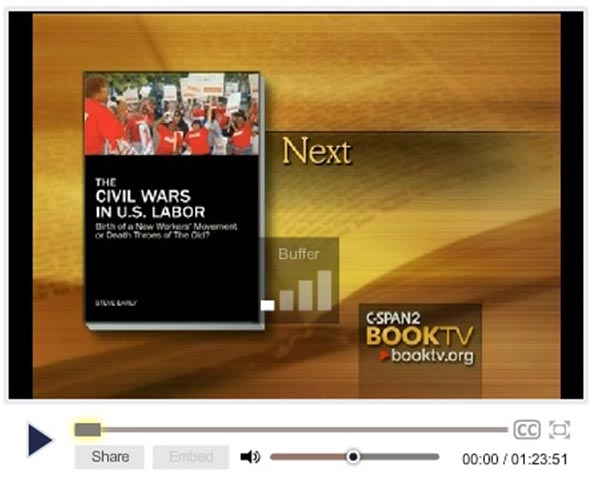 |
|


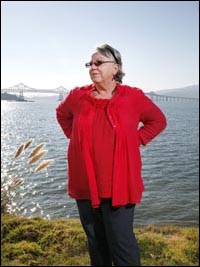




























 October 21, 2016
October 21, 2016


























 One of the great things about living near Chevron’s big East Bay refinery—yes, the one that caught fire and exploded two years ago—is its system of early warnings about new disasters about to befall Richmond.
One of the great things about living near Chevron’s big East Bay refinery—yes, the one that caught fire and exploded two years ago—is its system of early warnings about new disasters about to befall Richmond.


 For three years in the early 1970s, journalist Studs Terkel gathered stories from a variety of American workers. He then compiled them into Working, an oral-history collection that went on to become a classic. Four decades after its publication,Working is more relevant than ever. In honor of the book’s 40th anniversary, In These Times asked several regular contributors to conduct interviews with workers employed today in the occupations that Terkel's original interviews described so well.
For three years in the early 1970s, journalist Studs Terkel gathered stories from a variety of American workers. He then compiled them into Working, an oral-history collection that went on to become a classic. Four decades after its publication,Working is more relevant than ever. In honor of the book’s 40th anniversary, In These Times asked several regular contributors to conduct interviews with workers employed today in the occupations that Terkel's original interviews described so well. 